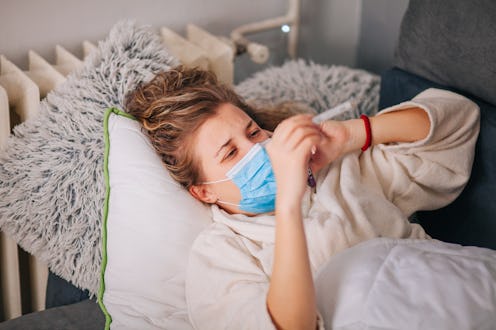Health
My Roommate Has COVID — Now What?
Doctors explain why COVID doesn’t always spread to every housemate.

All the best evidence shows that if someone you live with tests positive for COVID-19, there's a high chance you'll get it too. But what about your cousin who kept testing negative while their wife was sick for a week? Or your college BFF who was the only one of her four roommates to get sick? Though household spread is a serious driver of COVID infections, living with somebody who has COVID-19 isn't a 100% guarantee you'll catch it. Doctors tell Bustle that the fact that some housemates escape COVID-19 infection while others are laid low is a reflection of how viruses spread.
If you live with somebody with COVID-19, but have managed to avoid getting it yourself, your escape may be partly luck. "It is possible you just got lucky and the infected person didn't release any droplet particles into the air," Dr. Tania Elliott M.D., an allergy and infectious disease doctor at NYU Langone Health, tells Bustle. Your housemate may not have been very contagious (or kept their mask on inside).
Infectiousness depends on how many droplet particles a person produces, and how long they contain the virus for. And both of those things can vary a lot. "The part that is always hard to know is how much virus the person who might infect you has at a given point," Dr. John Sellick D.O., expert on infectious diseases and professor of medicine at Jacobs School of Medicine & Biomedical Sciences at the University of Buffalo, tells Bustle. "We know that with SARS-CoV-V2, the largest amounts of virus are present from a day or two before symptoms appear, and running for a few days after that. So contact with someone earlier in infection is more likely to get you into trouble than later on." A study of 94 COVID patients and those they infected, published in Nature in April, found that 44% of people caught it from patients who weren't showing symptoms yet.
Some people stay infectious for a lot longer than others. MedScape reports that various studies have found people with COVID stay infectious between eight and 37 days after they first caught the virus. It's not clear why there's so much variation. "A source's immune system, activity, and so on may make it easier to put larger amounts of virus into the air," Dr. Sellick says.
If your roomie had no symptoms at all, you were still at risk. An editorial in British Medical Journal in December said that asymptomatic people might not be very infectious, but a statistical model by the CDC published in JAMA Network Open in 2021 found that they may actually be responsible for 60% of cases.
Behavior matters, too. Dr. Sellick says the super-spreader case at the choir practice in Washington in March, where 52 people caught COVID and two died, shows what happens when somebody is very infectious and behaving in a way that spreads the virus. "If the source patient has a very productive infection and is singing her heart out, you get the situation with a few dozen people getting infected." If your roommate has isolated themselves and you've been washing your hands, cleaning everything in sight, and wearing masks, Dr. Elliot says, you can both prevent infection.
Where you live will have contributed, too. "If you’re in a small room with poor ventilation, the risks will be greater than if you are outdoors or in a very large room that has good ventilation," Dr. Sellick says. Your own immune system may have also helped, he says; if you're young, have no underlying conditions, and your immune system is robust, you may have a bit more protection.
If your roommate comes home with a positive test, Dr. Elliott recommends taking these precautions: wash your hands and all surfaces frequently, shower immediately after you're in contact with them, and avoid touching your hands or face. They should also self-isolate away from communal areas. If you have multiple bathrooms, designate one for their use alone. The CDC also recommends that everyone wear masks when in shared areas of the house and practice social distancing. The housemates who aren't sick should quarantine, in case they do develop symptoms.
As COVID cases rise and a new, more infectious variant has appeared in the UK and South Africa, it's still crucial to stay home, mask up, and wash your hands. If you bring home COVID, it's not guaranteed you'll give it to everybody else in the house — but you'll all have to be very vigilant, and really lucky.
Sources:
Dr. John Sellick D.O.
Dr. Tana Elliott M.D.
Studies cited:
Johansson, M. A., Quandelacy, T. M., Kada, S., Prasad, P. V., Steele, M., Brooks, J. T., Slayton, R. B., Biggerstaff, M., & Butler, J. C. (2021). SARS-CoV-2 Transmission From People Without COVID-19 Symptoms. JAMA network open, 4(1), e2035057. https://doi.org/10.1001/jamanetworkopen.2020.35057
He, X., Lau, E.H.Y., Wu, P. et al. Temporal dynamics in viral shedding and transmissibility of COVID-19. Nat Med26, 672–675 (2020). https://doi.org/10.1038/s41591-020-0869-5
Oran, D. P., & Topol, E. J. (2020). Prevalence of Asymptomatic SARS-CoV-2 Infection : A Narrative Review. Annals of internal medicine, 173(5), 362–367. https://doi.org/10.7326/M20-3012
Pollock, A.M., Lancaster, J. (2020) Asymptomatic transmission of covid-19 BMJ 371 :m4851